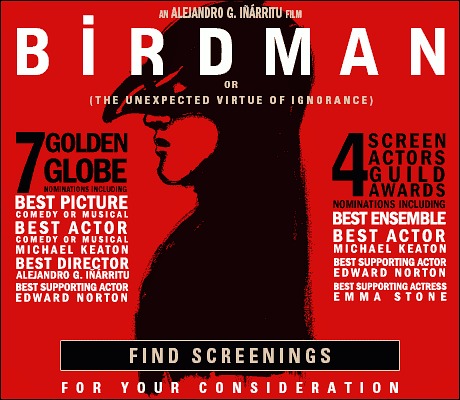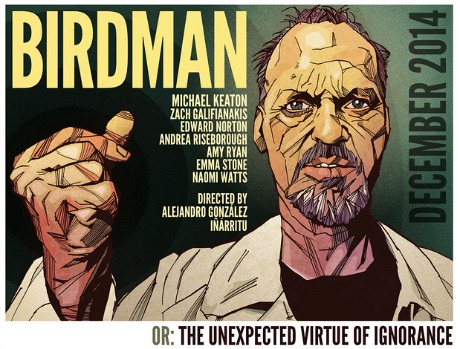Click here to jump past HE Sink-In

By all that is right, fair and profound, a film that wins the Best Picture Oscar should pass the “wow!” test. Agreed, many past winners haven’t lived up to this standard. Time and again Academy voters have rewarded films that comfort or affirm basic truths or remind us, movingly, how things are. Or how we’d like them to be. And there’s nothing wrong with that. Well, now and then there is. Within the last 12 years the Best Picture Oscar has been handed to Chicago, Crash, The King’s Speech and The Artist, or what I call The Four Embarrassments. But in the hearts and minds of those who watch over this town and this industry, Best Picture winners should turn heads, open doors, make history, raise a few eyebrows and rock the rafters on some level or another. They should make you say “Wow, I just saw something!” And they should at least make you want to watch them a second time, if not a third or fourth.
A few days ago I watched Alejandro G. Inarritu‘s Birdman for the fifth time, on a 55-inch TV with friends who hadn’t seen it before, and I swear to God it hadn’t diminished. It still pops and chortles and lurches around and slides into home plate like a champ. Lord knows I’m not saying it’s a “better” film than Boyhood or Selma or The Imitation Game, its three biggest competitors. (What does that mean anyway?) But it’s the only film that melts into itself like music and which flies above Tin Pan Alley and reminds that the spirit of Federico Fellini’s 8 1/2 is alive and well in the 21st Century. And it’s one of the few comedies I’ve seen in my life that could be called sad or autumnal or…what’s the word, whiplashy? Or which foregoes the mere telling of jokes or eliciting of laughter for what you might call withering God’s-eye humor.

Is “God” capable of laughing at anything? Can He/She even be bothered? Perhaps not, but if He/She has the slightest interest in our struttings and frettings, Birdman suggests that He/She might have a sardonic attitude. Certainly when it comes to the spectacle of an older, used-to-be-hot actor who mocks Twitter and doesn’t even have a Facebook page…a guy with problems and demons trying to re-float his boat in choppy seas…a guy who isn’t hip enough to understand that nobody wears white Fruit-of-the-Loom underwear…a guy who’s trying to make it all come out right despite the fact he’s scared shitless and wondering what the hell…a guy who’s teetering like a bowling pin…a guy who certainly could use and for the most part deserves heavenly compassion (i.e., a break) but is forced to do without it for most of Birdman’s running time.
Does Birdman give good hug? Is it a comfort blankie? Does it make you feel cleansed of your sins and smelling like talcum powder? For me, yeah — it does all that. But not for everyone, apparently. For some “wow!” isn’t enough. Not currently, at least. Great nervy films sometimes have to wait a while to get the up and down full-love treatment.
But it’s certainly a great weight-of-the-world film about how it feels to struggle with a creative project that won’t come together while having to keep it together on all the other fronts. And it has heart. And it’s hilarious. And a little snarly at times. It’s an absentee father-neurotic daughter film that reaches right down. And it sure lays it on the line about what mainstream corporate Hollywood is mostly up to these days. And it knows how to expound on acting and writing and pretentiousness and the differences between judging and doing. And it sure carries you aloft visually and makes you feel like you’re swimming at times, and other times like you’re driving a beautiful classic convertible late at night through a big city and without much traffic. And for that you’d have to thank cinematographer Emmanuel Lubezki as well as Mr. Inarritu, who has made, really, a kind of portrait of himself here.
But yeah, it’s a tough, flinty film for the most part. Poetic, funny-ass flinty with a little coming-apart-at-the-seams. Then again tough and flinty only get better with the passing years so there’s that.
Nearly four months ago I half-stumbled out of the Werner Herzog cinema in Telluride after my first Birdman viewing, feeling pretty damn delighted. I described it early the next morning as “an audacious, darkly hilarious serving of snap-crackle brilliance and psychological excavation par excellence…a work of reaching, swirling genius.”
“Birdman is not just a visual groundbreaker — not actually a single seamless, roving Steadicam shot from start to finish but a wonderful illusion of this. It’s more profoundly a searcher, reacher and a mad leaper of a film with one live-wire, mad-pistol performance after another. Everyone sings and dances and somersaults in this tag-team circus but Keaton is the leader and the daddy. He opens himself up and slices in like a surgeon in an awesome, at times unsettling tour de force.”
You know something? I said it really well back then.
Birdman is about Riggan Thomson (Keaton), a has-been Hollywood actor who was quite hot in the ’80s and ’90s, especially after portraying the mythical Birdman, a winged superhero, in three effects-driven, ComicCon-friendly blockbusters about same, but whose fortunes declined somewhat (i.e., became shall we say a little spotty) after he “said no to Birdman 4” — nominally a Keatonesque self-portrait. Thomson is now struggling to make a kind of artistic comeback in a Broadway adaptation of Raymond Carver‘s “What We Talk About When We Talk About Love.”
All the fears and anxieties that plague every artist or would-be artist who has ever tried to expand his/her repertoire are crawling all over Thomson. Everyone is on him or in him — pushy costar Mike Shiner (Edward Norton), Shiner’s costar and significant g.f. (Naomi Watts), Thomson’s testy daughter (Emma Stone), his ex-wife (Amy Ryan) and unsettled girlfriend (Andrea Riseborough). He peaked 20 years ago, is “over” in 20th Century terms (unknown or marginal in the eyes of under-25s, no Twitter or Facebook accounts), is self-loathing and emotionally unstable in fits and starts, admitting to having been a lousy dad, panicking about the play being an embarassment or panned by the N.Y. Times or both…no comfort, stomach acid, etc.
Birdman is one of the most antsy, emotionally exposed, drill-down big-city comedies I’ve ever experienced, and probably the most transcendent, spirit-lifting film I’ve seen this century with Children of Men running a close second. It’s actually more of a psychological angst-and-anxiety movie with an infusion of Ingmar Bergman enzymes and occasional hyena laughs. It’s not a laugh riot per se but when it connects it’s fall-on-the-floor.
And yet Birdman is (and I love this aspect) fundamentally a New York-centric flick about the state of current creative aspirations and values, and a film that hates the fleeting, Twitter-propelled consciousness that defines almost everything today. It’s in love with the real-deal gleam and glimmer of the Broadway stage and the tough, anxious performers who put themselves on the line in front of discerning audiences…all that romantic All About Eve smell-of-the-crowd lore fast-forwarded 65 years. It follows that Birdman despises the Hollywood that has manifested over the last 20 or 25 years — a town of ADD, effects-driven, ComicCon-catering swill merchants. So don’t kid yourself — this is a nervy anti-Hollywood movie that the status-quo clingers and comfort-seekers are probably going to shy away from or regard from a certain distance.
And I’m barely mentioning the twitchy, hair-trigger aliveness of Norton, Stone, Riseborough, Ryan and Watts. Not to mention the great Lindsay Duncan as an especially frosty N.Y. Times critic. And an agreeably toned-down Zach Galifianakis minus the man-diaper. I’ve despised each and every performance ZG has given previously so this was a revelation — I actually respected and enjoyed his anxious, screwed-down theatrical producer.
Have I left anything out? No? All right then — Birdman for President. For Best Picture, I mean. Hollywood Elsewhere beseeches.

